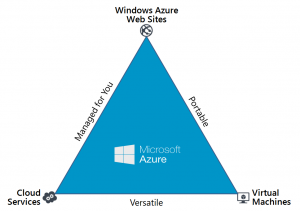Microsoft Azure is a cloud computing platform created by Microsoft that is designed to run applications to be scaled out on the internet.
Why Microsoft Azure Cloud?
Microsoft Azure takes an application-centric view of cloud computing which means that it manages the entire life cycle of the application. From the initial design, development, and testing of the application to deploying it on the cloud, to monitoring and scaling that application when it is running out on the internet. Microsoft offers real-world experience with built apps and services such as outlook.com, Bing, Xbox Live, and Office 365 on cloud technology. All of these technologies are being used to build Azure.
What’s with Microsoft Azure?
Microsoft Azure is a broad stack of services that runs in all the data centers globally. Think of the different services as building blocks. These services can be categorized into 3 classes. The first is infrastructure services which are low-level building blocks. They are an abstract set of computer resources in the data center running virtual machines. The second is the data storage service that provides storage and data management capabilities to help your application manage all of its data in a reliable and scalable way. The third component is the developer experience where the infrastructure, storage, and all of the APIs are packaged in the cloud and made available to the developers. Some integration with Visual Studio is delivered in the form of an SDK that can be downloaded for a free trial and run locally. This means you can develop and test your application locally before you deploy it to the cloud.
Benefits of Microsoft Azure:
- Applications can be developed and deployed within minutes which means one can get their apps out there in the market as quickly as possible. The speed and agility that this gives also mean that one can reiterate quickly to improve on their apps.
- It is open and flexible, provides first and best-class experience and support for Microsoft workloads, and embraces other open technologies. In addition to Java and .NET, it supports PHP, Python, and other languages. Excellent support for open frameworks like Hadoop, and web frameworks like Word Press, Joomla, and Drupal. Also provide 1st party SDKs for developing apps using Android, iOS, or Windows phones.
- It follows a utility model where you pay for only what you need and only when you use it. With this model, you can stop worrying about where your peak (limit) is, you can stop paying for things upfront and you can save a lot of money.

Microsoft Azure Infrastructure services allow you to scale up to multiple instances using virtual machines. Developers can use these virtual machines to develop and test any of the applications. Websites can be built using Azure which acts as a powerful self-service platform. It is highly secure with enterprise availability, support for SSL, and active directory authentication. With Windows Azure mobile services one can easily and quickly build cross-platform mobile apps that scale.
Finally, Azure helps one to understand the application and analyze it so that one can build a better version and deploy that to the cloud without entering any downtime. It is more economically viable as you need to pay for only what you use. This means that you have great cost savings and can achieve great efficiencies.
To start please refer to Microsoft Azure training courses.
Have questions? Contact the cloud computing experts at InApp to learn more.
